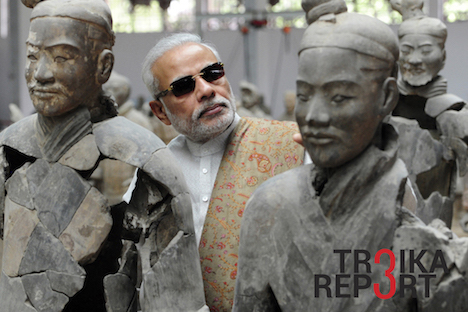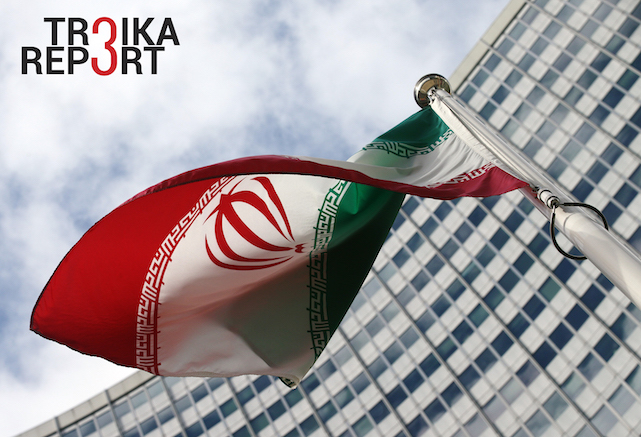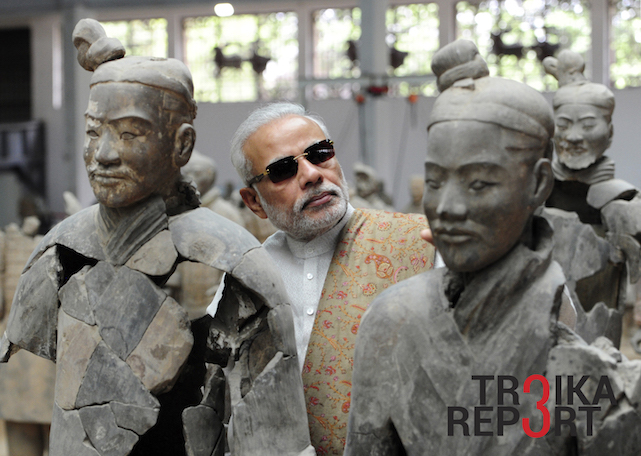

U.S. Assistant Secretary of State Victoria Nuland delivers a speech during a press conference at Spaso House - residence of the U.S. Ambassador to Russia in Moscow, Russia, Monday, May 18, 2015. Source: AP
Russian hopes for a new “reset” in U.S.-Russia relations suffered a setback less than a week after U.S. Assistant Secretary of State Victoria Nuland’s visit to Moscow. Contrary to expectations, no progress was reported as a result of Nuland’s whistle-stop visit.
Russian Deputy Foreign Minister Sergei Ryabkov described the state of bilateral dialogue as “deplorable.” Ms. Nuland, in turn, termed the talks she held in Moscow in the Russian MFA “detailed” and “pragmatic” but without a hint of any possible breakthrough.
In fact, Nuland’s statements revealed that Washington is looking for a new role: to supervise the Ukraine peace talks while not becoming formally involved. The welcome news in this context was the statement by Nuland that the U.S. is seeking to influence the implementation of the peace deal and regards the Minsk agreements as the basis for a settlement.
In an apparent attempt to boost and highlight the United States’ role in resolving the crisis, Ms. Nuland announced that she had personally received assurances from Ukrainian President Petro Poroshenko that Kiev had no intention of playing the role of the aggressor by restarting hostilities in the Donbass. Given the special relationship between the Obama administration and the government in Kiev, the latter is now committed to honoring its promise to its main financial donor not to launch any offensives in eastern Ukraine. The question is now whether Russia can ensure the Donbass rebels will also refrain from fresh attacks.
Prior to the visit some Moscow commentators nurtured a rather slim hope that a diplomatic breakthrough was in the making. But since the talks focused on the contentious issue of the Ukrainian crisis, now in its second year, there were few chances from the outset for either a “quick fix” or a “benign neglect” attitude on the part of Moscow or Washington.
Nevertheless, Ms. Nuland’s visit came hard on the heels of U.S. Secretary of State John Kerry’s much-hailed talks with Russian President Vladimir Putin and Foreign Minister Sergei Lavrov in Sochi, where the two sides reportedly agreed that efforts should be made to improve bilateral relations.
Does the visit by Ms. Nuland offer any tangible opportunities for an improvement in bilateral relations? Andrei Kortunov, general director of the Russian Council for International Relations, provided a comment for Troika Report:
“We can hope that the visit could be a turning point, that we have hit the bottom and started to overcome the crisis in our relations. It is too early to make final conclusions but it is important that Victoria Nuland was in Moscow, and it is important that both sides intend to restore the direct line of communications between the U.S. State Department and the Russian Foreign Ministry. I hope this visit will generate some practical results not limited to the Ukrainian crisis, although, definitely, this crisis is at the center of the problem and has to be addressed.”
— Do you not find it surprising that a conciliatory tone was expected from a person with a reputation of playing the “bad cop” towards Russia?
“It has been a standing tradition that whenever the United States wants to correct its relations with Russia it usually dispatches someone who is recognized as a “hawk” and not a “dove.” I think Victoria Nuland has credibility (in the first capacity) and would not be criticized by neo-cons, who would otherwise consider these moves as the U.S. administration making concessions to the Kremlin. She is the right choice. We should also keep in mind that Victoria Nuland is the person ‘behind the lines’ in the relations between the U.S. and Ukraine. Therefore, she is in the best position to explain the situation in Kiev, the opportunities and the limitations related to the current Ukrainian leadership.”
Notably, Deputy Foreign Minister Sergei Ryabkov reiterated that Moscow was ready to continue dialogue with Washington on all contentious issues, particularly in the military and political spheres. Despite the accumulated skepticism, both sides might be inching towards some sort of understanding, after all.
At least, this is something hoped for by pragmatic political figures and is essential for both regional and global stability. Troika Report duly notes the “wishful thinking” of some Moscow-based foreign policy analysts. It betrays the general feeling of psychological weariness regarding the ongoing war of sanctions and war of words. Could there be a similar weariness among policymakers in Washington?

An Iranian flag flutters in front of the United Nations headquarters, during an International Atomic Energy Agency (IAEA) board of governors meeting, in Vienna, March 4, 2015. Source: Reuters
Who stands to benefit more from the return of Iran to the mainstream global economy and politics? Will Russia capitalize in full on the lifting of the restrictions around its powerful neighbor on the rise?
The answers are conditional on the outcome of the final round of negotiations between the P5+1 and Iran, which started on May 19 in Vienna. Drafting of the conclusive agreement on the Iranian nuclear program in order to meet the June 30 deadline is already underway.
The deal could still be scrutinized on Capitol Hill in Washington. Moreover, in March, 47 Republican U.S. senators have threatened Tehran that they would revoke the deal once Barack Obama vacates the White House.
Yet Obama’s administration has a firm intention to win over Iran to its side as a long-term goal, substituting or probably replacing its former strategic allies, now in decline. Obama has even managed to convince the Gulf petro-monarchies to relinquish its staunch opposition to a deal with Iran.
In this context, what are the stakes for Russia in the agreement to roll back the Iranian nuclear program? The answer was provided for Troika Report by Dmitry Polikanov, Member of the Executive Board of the Moscow-based PIR Center think tank:
“This deal will finalize a long process of negotiations and mark the end of the “era of confrontation” between the West and Iran. The most important element on what Russia insists is that any solution should not become a precedent. Russia is trying now to avoid a repetition of the American practice of creating precedents, and wants international law, including the involvement of the United Nations, to be applied to the Iranian case. The solution now discussed should be based on the basic principles of the International Atomic Energy Agency and should be aligned with the lifting of sanctions.
— The abandonment of sanctions would allow Iran to become a full-fledged member of the international community. What opportunities does it open for Russia and its partners in the CIS?
“The elimination of sanctions will lead to a surge in the trade turnover between Russia and Iran. There are a lot of things which we could do together including cooperation in industry and energy fields. Iran is a potential big purchaser of Russia-made armaments.”
“The only thing we should take into account is that Iran is a major player on the oil and gas market. So Russia might face growing competition.”
Russia’ stance on engaging Iran is determined by two considerations. First, Moscow would not be happy should Iran arbitrarily storm into the exclusive club of nuclear powers as its 10th member: It would then lure Saudi Arabia into becoming the 11th participant (Riyadh recently showed interest in purchasing an atomic bomb from Pakistan), make Israel fidgety and less predictable, and thoroughly destabilize the whole region.
Second, Moscow is gambling on untapping Iran’s 80-million consumer market with its huge growth potential. It welcomes a peaceful atom-based energy strategy from Iran since Russia has a competitive edge in offering state-of-the-art and secure technology for nuclear power plant construction.
In April, Russian President Vladimir Putin lifted a self-imposed ban on delivering the S-300 anti-missile rocket system to Iran in anticipation of a comprehensive deal on its nuclear program. The move provoked a highly nervous reaction in the U.S. and Israel.
Apart from dumping a serious irritant between the two governments (after Moscow canceled the supply contract in 2010 under pressure from the West), it will serve as a probable deterrent to a potential missile attack on Iranian nuclear power generation facilities and other strategic installations.
Additionally, with the delivery of the S-300, Moscow is positioning itself as a provider of additional national security for Tehran, and probably expects to be paid back with preferential treatment. This all the more relevant given a plethora of indications that European business is in the “ready, steady, go” mode, eager and ready to engage the de-sanctioned Iran in trade and economic cooperation.
Meanwhile, according to unconfirmed reports, Moscow has already entered into a barter deal with Tehran and started deliveries of Russian-made construction materials and machinery, and also grain in exchange for crude oil.
In sum, the race for the Iranian domestic market and for sourcing from its oil and gas export potential is gearing up. Moscow would not want to be lagging behind.

In this May 14, 2015 photo released by China's Xinhua News Agency, Indian Prime Minister Narendra Modi visits the Emperor Qinshihuang's Mausoleum Site Museum in Xi'an, capital of northwest China's Shaanxi Province. Source: AP
Foreign policy is often about symbols and perceptions, as explicitly proved by the recent visit to China by Indian Prime Minister Narendra Modi. The watershed event has opened a window of opportunity for an accelerated warming up of relations, and this is more than just good news for Russia.
Despite a bitter legacy of past conflicts and contemporary rivalry, Mr. Modi’s three-day tour sent a signal that the two powerhouses, with their high economic growth and home to a third of the planet’s population, have finally realized that the moment is ripe, if not overripe, to patch up old quarrels and join forces to shape the emerging “brave new Asia.”
The long-lasting animosity has roots in the border dispute dating back to 1914. Britain, the colonial master of India at the time, drew out the so-called McMahon Line, which was not accepted by China as a formal boundary. The border dispute eventually provoked a war in 1962, and its scars are still felt by both sides.
This time, Prime Minister Modi and China's Premier Li Keqiang have agreed to seek a “fair resolution” to border disagreements and let bygones be bygones. As Li pointed out, the two countries have “enough political wisdom to manage and control” differences, adding that “our common interests are far bigger than our differences.”
This step forward in relations between Delhi and Beijing was backed up by 21 signed agreements and MoUs estimated to be worth $22 billion. The envisaged cooperation covers a range of areas of mutual interest like manufacturing (steel and metals), power generation infrastructure, small & medium business, and the film and entertainment industry.
Both nations can benefit from the positive engagement. India has a huge appetite for foreign investments given Narendra Modi’s commitment to the grand vision of the “Make in India” policy, while China can tap the no less promising consumer market of India by adding it to its end-user list.
To assess the true value of Modi’s visit, Troika Report approached Brian Yeung, an independent financial analyst in Hong Kong, who says that it could become “a game changer in Sino-Indian relations and the world of emerging economies.” Here is what Yeung had to say:
“The past few years have seen an increasingly strained relationship between the two rising powers in Asia and their trade deficit soared from $1 billion in 2001-2002 to $38 billion last year. Measures to tackle trade deficit such as signing MoUs to improve market access topped the agenda for this visit.
“Given India's strategic importance to China's ‘One Belt, One Road’ initiative as well as the BRICS alliance, an improved economic partnership between China and India will carry significant implications for the world's economy. As the SCO and the BRICS summits are just two months from now, we are expecting a new golden age for the Asian economy and a brave new world defined by the Global East.”
A similar positive appraisal was made for Troika Report by Manish Chand, CEO and founder-editor-in-chief of the India Writes Network, who called the visit “a milestone” and predicted that it will chart “a roadmap for the long-term development” of India-China relations. Chand also placed it in a wider context:
“Overall, Prime Minister Modi’s visit, coming as it does barely months after Chinese President Xi Jinping’s visit, underscores the strategic intent of the two Asian giants to build up a narrative of win-win cooperation in shaping an Asian century, rather than the construct of rivalry, as conjured up in sections of the Western strategic circles and media.”
It is noteworthy, that on the eve of his departure for China, Modi phoned Russian President Vladimir Putin and confirmed his attendance of the Shanghai Cooperation Organization (SCO) summit in Ufa this July.
Since the SCO is evolving into a formidable union with enormous potential for growth, the dismantling of roadblocks in the turbulent relationship of the two Asian majors would serve as an impetus for further economic integration which, invariably, requires a high level of political coordination or at least putting aside differences. The India-China joint statement specifically noted that both sides intend to show “respect and sensitivity to each other’s concerns, interests and aspirations.”
Moscow has a big stake in smoothened interaction between Beijing and Delhi since it paves the way for molding a “triangle” of nations capable of playing a significant role in ensuring global stability.
The opinion of the writer may not necessarily reflect the position of RBTH or its staff.
All rights reserved by Rossiyskaya Gazeta.
Subscribe
to our newsletter!
Get the week's best stories straight to your inbox